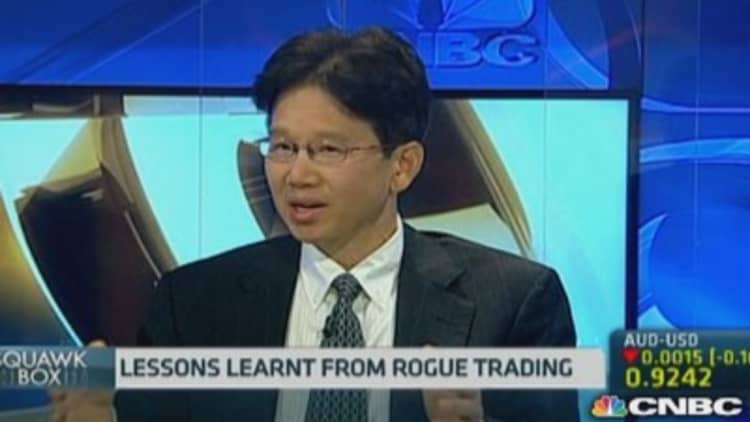
Rogue trader Toshihide Iguchi hid $1.1 billion worth of losses while working for Daiwa Bank in the 1980s, but he told CNBC that he did not see himself as a criminal.
Although he isn't as well-known as Nick Leeson, the trader who's rogue trading losses saw the collapse of Barings Bank in the 1990s, Iguchi is considered one of the 'pioneers' of rogue trading. Between 1983 and 1995 Iguchi hid $1.1 billion worth of losses from Daiwa Bank. In 1996 he was sentenced to four years in prison and fined $2.6 million.
Despite the devastating repercussions of his actions, Iguchi told CNBC Asia's "Squawk Box" he did not believe the punishment he received fitted the crime.
"Absolutely not [the punishment did not fit the crime]. I don't even think it's a crime. It's nothing but a violation of internal rules," said Iguchi.
"I never profited a penny from this. That's the difference between a [rogue trader and a] swindler - they are trying to enrich themselves. Rogue traders aren't doing this to enrich themselves, they are trying to get their jobs back," he added.
Read MoreSocGen 'rogue trader' Kerviel heading for jail
Iguchi's problems began when he started hiding small trading losses by selling bonds in sub-custody accounts in an attempt to trade his way out of trouble, but the losses spiraled out of control.
He is reported to have forged 30,000 trading slips and sold off around $377 million of Daiwa Bank customers' securities and $733 million of the bank's own investment securities to cover his tracks.
Asked why he didn't own up to his mistakes early on, Iguchi said it's a trader's mentality to keep trading rather than admit defeat.
"At that point you are so desperate, you can't think about it. As long as there is a chance to recover, you make an effort to recover the loss for the bank that's why there's not a sense of criminality," he said.
Other recent high-profile rogue trading cases include the London Whale debacle which cost JP Morgan over $6 billion in 2012, while UBS's Kweku Adobli cost UBS $2.3 billion in 2011, and Jerome Kerviel nearly brought Societe Generale to its knees in 2008 with $70 billion worth of bad debts.
Iguchi said it was not true that rogue traders were simply 'bad apples'.
"That's the fallacy. We always say they are the bad apples [but] any trader can be a rogue trader if you are in the wrong place. The blame has to go eventually to the top. Corporate culture facilitates these types of activities... always looking for profits at any cost, then the risk management system weakens," he said.
"It's not even right or wrong. Once you've stepped in to rogue trading it's like quicksand," he added.
Read MoreRogue Trading: A How-To Guide
Asked how it was possible to keep the losses under wraps for over a decade, Iguchi said it was simply a case of not getting found out.
"You have to hide it until someone finds you or you have to come forward, in my case no one discovered it," he said.
Iguchi added that he had several "co-operators" who had unknowingly helped him hide his wrongdoings, including people working in the bank's custody department and externally several brokers and traders.
Read MoreHow Did the UBS Rogue Trader Lose $2 Billion?
"People that are working there are all loyal to me because I was their boss. Basically I had the back and front office under my control," he added.
The former trader, who now works in foreign language education, has written a book about his experience: My Billion Dollar Education: Inside the Mind of a Rogue Trader.


